Dr Robert Laidlow, Career Development Fellow in Music at Jesus, has created a symphonic work titled ‘Exoplanets’ following an informal discussion with Professor Ray Pierrehumbert, Senior Research Fellow in Physics, about his interdisciplinary research to understand the climates, atmospheres, surfaces, interiors, dynamics, formation, evolution, and habitability on the many worlds both in our solar system, and throughout our galaxy.
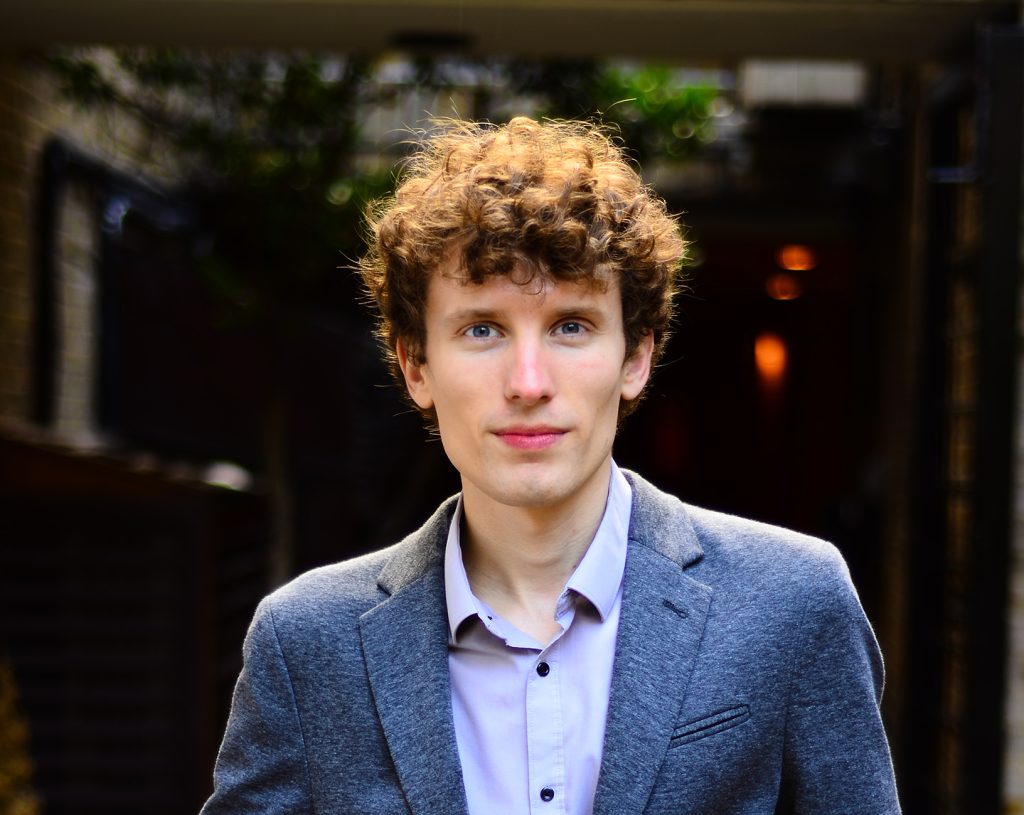
Dr Robert Laidlow, Career Development Fellow in Music at Jesus College.
Rob says, “This project began completely by chance when I sat next to Ray one day over lunch in the Mansell Room, and he explained to me his remarkable research on exoplanets, and its connection with musical ideas. I was completely inspired, and so began this project which translates a huge variety of exoplanet research data, ideas and discoveries into sound. Since then, it’s taken on a life of its own, leading to collaborations with exoplanet researchers across the UK, Switzerland and the USA, and two major symphony orchestras. This new composition is inspired by both these incredible exoplanets, and the methods scientists use to discover them, and aims to takes the listener on a cosmic, time-travelling journey to the strangest corners of our galaxy.”
‘Exoplanets’ was commissioned by the London Philharmonic Orchestra and Interfinity Festival Basel. It will be performed as part of the LPO’s Harmony with Nature series on Saturday 29th November. For more information, and to book tickets, click here.
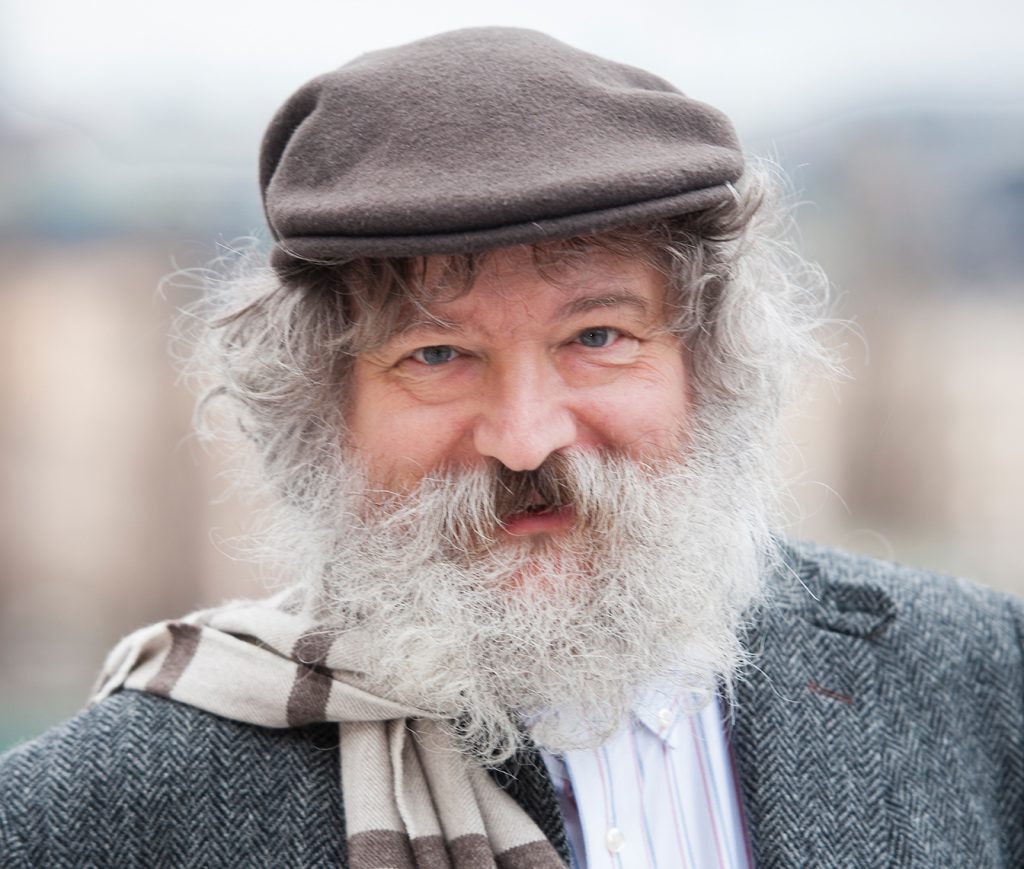
Professor Raymond Pierrehumbert.
Professor Alexandra Wilson, Senior Research Fellow in Music, is to publish a new book that investigates why, when and how the opera-elitism stereotype developed in Britain.
Someone Else’s Music: Opera and the British (OUP, 2025) is the first book to explore shifting cultural attitudes towards opera over the past 100 years, and reveals a hidden history of popular opera-going in Britain that counters perceptions of opera’s supposed elitism.
Alexandra, a musicologist and cultural historian, uses opera as a lens through which to examine the broader history of changing cultural values in the UK, from 1920s Reithian ideals about art’s civilizing qualities to contemporary culture wars. The controversies opera has prompted over the last century reveal a great deal about national identity: who Britons think they are, and who they want to be.
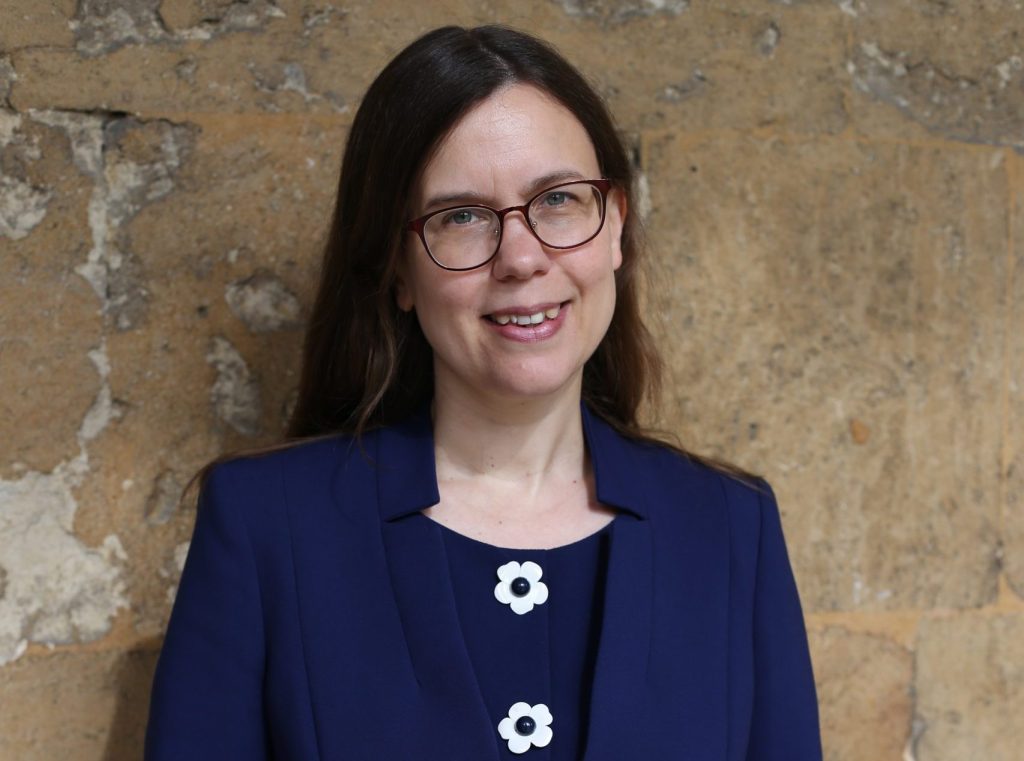
Professor Alexandra Wilson, Senior Research Fellow in Music
The book ranges widely across topics including education, public broadcasting, arts policy, and attitudes towards subsidy, and traces opera’s surprisingly close relationship with popular culture. Alexandra introduces readers to a diverse cast of characters, including working-class East-End opera fans, opera-singing Welsh miners, soldiers discovering opera in wartime Italy, and holidaymakers watching it at Butlin’s.
She says, “A few years ago I wrote a book about operatic culture in 1920s Britain [Opera in the Jazz Age]. It was quite clear to me that opera was not regarded as elitist at that time, so I wanted to find out what happened between then and now, and I also wanted to investigate why the British relationship with opera was particularly fraught. My new book, which was funded by a Leverhulme Major Research Fellowship, is the product of many years’ research, and took me to all sorts of fascinating archives. It became quite clear that opera was enjoyed by countless people from diverse backgrounds prior to the rise of the pernicious elitism stereotype – there used to be, for instance, a really thriving culture of working-class opera-going.”
So when did people start calling opera elitist, and why? Analysing lasting stereotypes around opera, Alexandra reveals them to be ideologically motivated, founded in deep-seated British anxieties about class, education, and national identity.
She says, “The opera-elitism stereotype is a relatively new idea: it started to circulate in the 1980s and gathered real pace through the 1990s and 2000s. A lot of different people have perpetuated the idea, sometimes out of pure laziness, sometimes to serve an agenda – politicians from both ends of the political spectrum, some people within the arts world itself, but overwhelmingly the media. My book shows that the opera-elitism stereotype is not an inherent truth but an ideological construct, and one that does a great deal of harm. It has enabled a situation where opera has become highly vulnerable to cuts, but it’s also really bad for access. Opera is often declared elitist by people who claim to want to make the arts more accessible, but characterising opera as the taste of ‘the posh few’ (to quote a recent Guardian article) signals to people that it is ‘not for the likes of them’ and puts them off trying out something that might otherwise become a source of lifelong joy. My book reveals that opera used to be seen as for everyone – and shows us how it could be again.”
Someone Else’s Music: Opera and the British (OUP, 2025)will be published in the autumn, and available for pre-order here.
Professor Alexandra Wilson is a musicologist and cultural historian. After holding two Oxford Junior Research Fellowships, she taught at Oxford Brookes University for nineteen years, latterly as Professor of Music and Cultural History. She is currently Researcher in Residence at the Guildhall School of Music and Drama in London and a Senior Research Fellow at Jesus College, Oxford. She has previously published The Puccini Problem (2007), Opera in the Jazz Age (2019), Puccini’s La bohème (2021) and Puccini in Context (2023). She writes and broadcasts widely about cultural matters, and works regularly with the UK’s leading opera companies.
Offering up a range of nine diverse events on topics as broad as digital health, big data, music for game controllers, language diversity and the US Capitol Riots, the programme aims to connect audiences with themes related to our world, and academic research, in the digital age.
The new season begins with the Inclusive Gaming Conference on Wednesday 1st May. This one-day conference brings together students, academics, and industry professionals to discuss research initiatives, works in progress, and future directions for explorations of inclusive gaming. The day consists of a series of roundtable discussions, keynote speakers, diverse presentations, and interactive gaming experiences. This is followed by the Digital Health Horizons Conference (Thursday 16th May), which delves into the dynamic interplay of digital health and medical artificial intelligence, exploring both the promising opportunities and significant challenges that lie ahead.
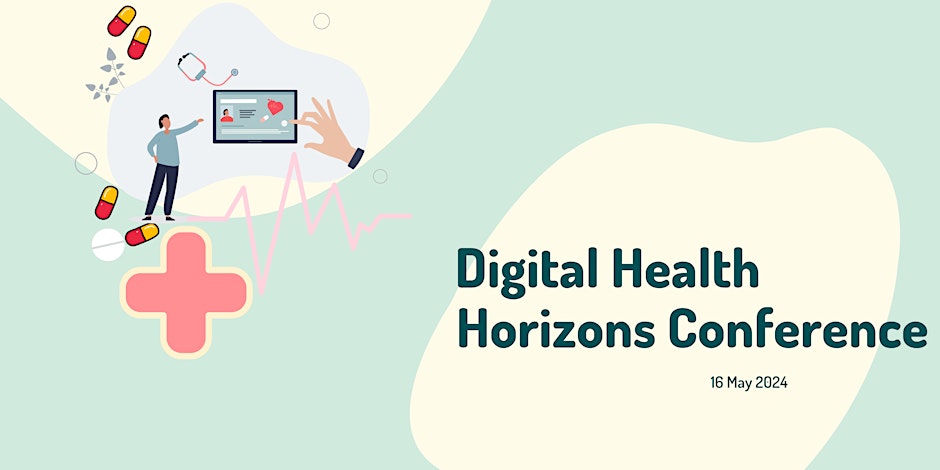
On Wednesday 22nd May we are delighted to be joined by Jesus College alumnus James Goldston (1986, PPE), a former President of ABC News, who will be giving a talk on Democracy on Trial: January 6 and the 2024 Presidential Election. James was tasked with producing the January 6 hearings conducted by the Select Committee to investigate the January 6th attack on the US Capitol. The ten historic hearings played a key role in the legal processes that are now underway against former President Donald Trump. Goldston, a former President of ABC News, joins us to discuss how the hearings came to happen, and why they remain so central to the future of American politics.
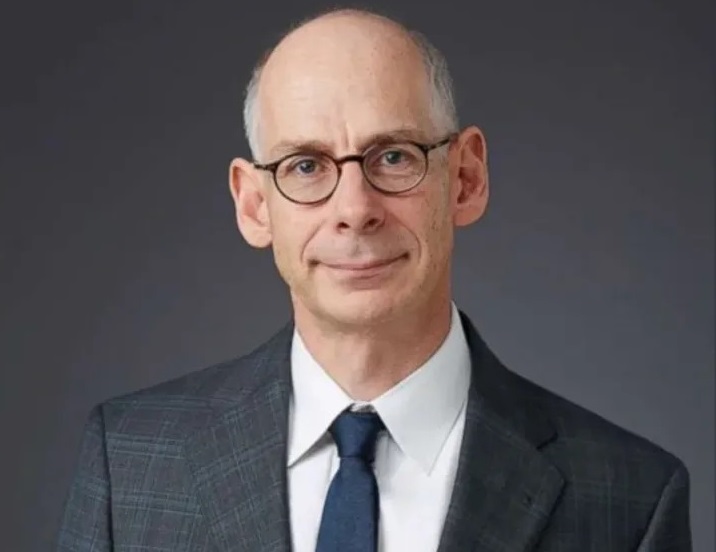
James Goldston
At Creative Multilingualism: Language Diversity in a Digital Age (Friday 24th May) guests can enjoy linguistically enriched snacks and drinks, and contributions from research and creative partners, on topics including teaching pronunciation with AI, interactions between linguistic diversity and biodiversity, and a Prismatic Jane Eyre. The event is organised by the University’s Creative Multilingualism programme, and includes a Yoruba/English musical finale by Grammy Award Winner Lekan Babalola (Percussion) and Kate Luxmoore (Clarinet).
A creative collaboration exploring the possibilities of video game controllers in music composition and performance features on Thursday 30th May. PLAY: Music for Game Controllers with the House of Bedlam includes a one hour performance of five new works and existing music to be interpreted by traditional instruments and video game controller instruments. Composers and performers share more about their creative processes, and audience members can try out the video game controller instruments themselves. The performances include a new work, Speedrun for cello and video game controller (2024) by Rob Laidlow, Career Development Fellow in Music at Jesus. The event is supported by The Cultural Programme, PRiSM, the Centre for Practice & Research in Science & Music at the Royal Northern College of Music, funded by the Research England fund Expanding Excellence in England (E3).
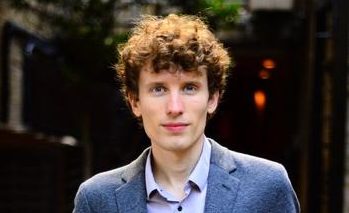
Dr Rob Laidlow, Career Development Fellow in Music at Jesus College.
Ben Goldacre, Professorial Fellow at Jesus College and Director of the Bennett Institute, will be giving the Inaugural Cheng Kar Shun Digital Hub Lecture on Tuesday 4th June. In From Bad Science to Better Data Ben will discuss his career advocating for better research methods, and the differences – if any – in addressing these complex issues with the public, policymakers, and researchers.

On Thursday 6th May we are honoured to welcome back the Institute for Ethics in AI for its Annual Lecture, which this year will be given by Professor Joshua Cohen. Professor Cohen (Philosophy and Law, Stanford) is a political philosopher. He has written on issues of democratic theory, freedom of expression, religious freedom, political equality, democracy and digital technology, good jobs, and global justice. His books include On Democracy; Democracy and Associations; Philosophy, Politics, Democracy; Rousseau: A Free Community of Equals; and The Arc of the Moral Universe and Other Essays.
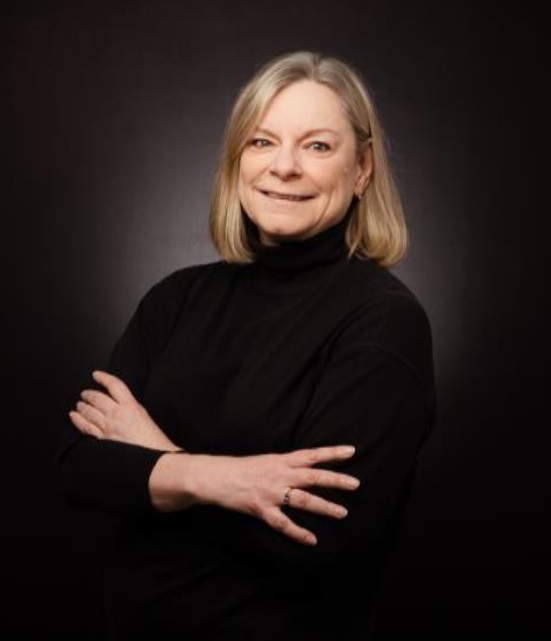
Professor Leah Tomkins
As part of a year of events marking the centenary of the death of the writer Franz Kafka, alumna Leah Tomkins join us for a conversation on her new book Franz Kafka and the Truths of Leadership (Edward Elgar Publishing) with the journalist and broadcaster Shelagh Fogarty on Friday 7th June. Franz Kafka is a writer who seems to crystallise modern understandings of the institutions of work, family, religion and the law, especially when they go awry. Images from stories such as The Trial and The Metamorphosis have soaked into the cultural conversation to such an extent that the expression ‘Kafkaesque’ immediately conjures up a mix of the awful and the absurd. Challenging the popular view of Kafka as patron-saint of the underdog, and emphasising the significance of his own work as a leader, Leah’s book explores Kafka’s expertise in the exercise of power. Kafka anticipates many of the core themes of leadership – both good and bad – but especially leadership of the populist, ‘post-truth’ kind, where facts are often overpowered by fictions and fantasies. The event will be introduced by Richard Ovenden, the Bodley’s Librarian, and is supported by ROUNDHOUSE FINANCIAL SERVICES (LONDON) LIMITED.
To round off the Trinity Term programme, the Digital Hub will host Hands-on History: Gaming Peripherals Past and Present on Tuesday 11th June. The event explores the history of gaming peripherals over the past 50 years on an innovative and interactive adventure. Guests can experience block stacking with R.O.B the Robot, musical jams with Donkey Konga, a real Mario Kart circuit with remote control karts, and much more! The event is supported by JoyPad.
To view the full listing page on the College website, click here.
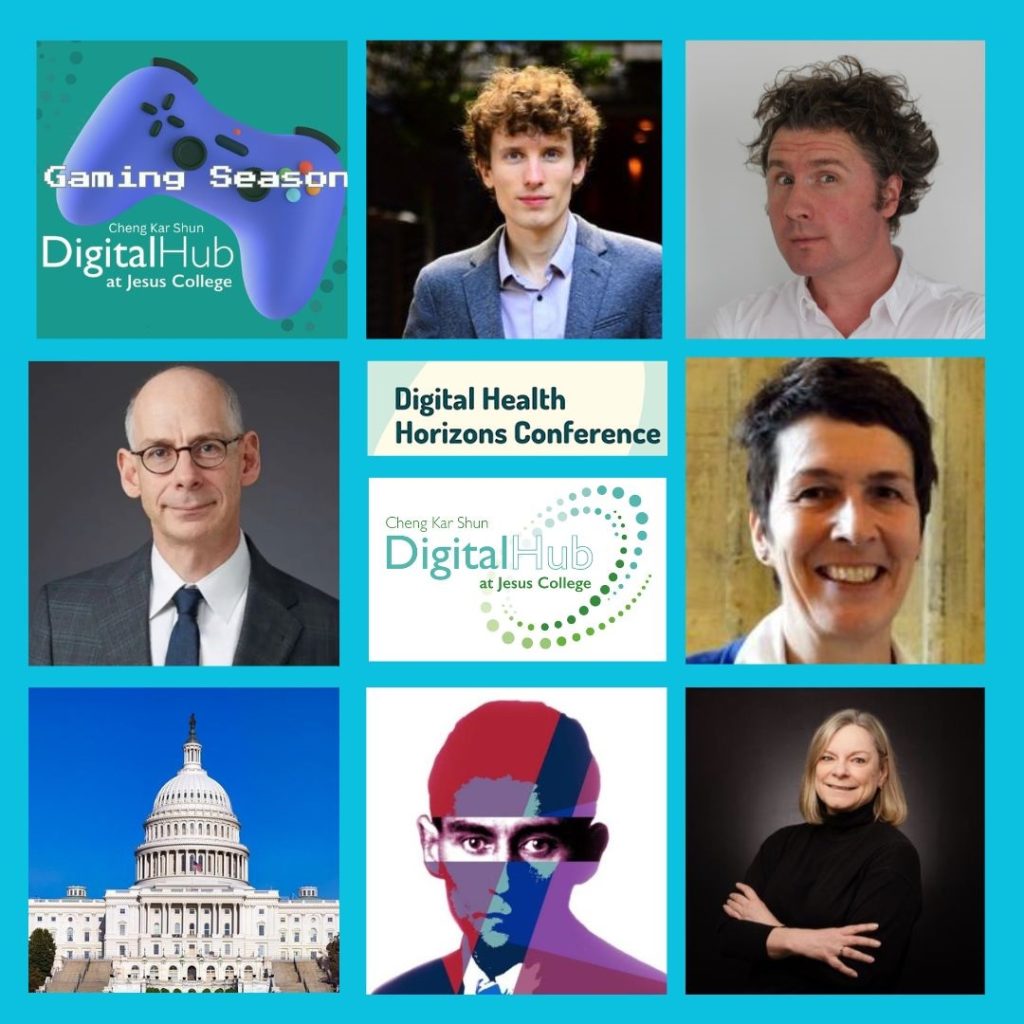
The RCO Diploma is highly prized in organ scholarship. It demands the combination of technical, and interpretative, skill with the stylistic, analytical and historical understanding that marks out the truly accomplished musician. The Associateship (ARCO) validates ‘professional competency’.
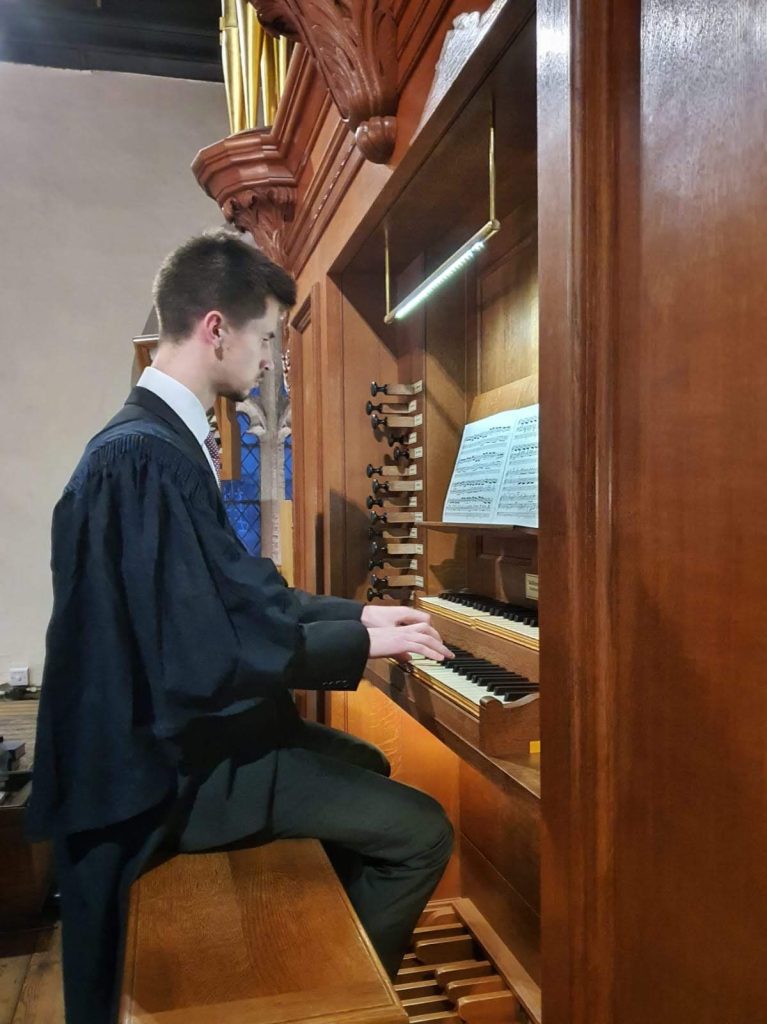
Conrad Spencer, Jesus College Organ Scholar, pictured playing the Chapel organ in 2022.
The Associateship examination consists of two sections: a Practical Examination (comprising Organ Performance and Keyboard Skills Portfolio) and Written Papers (comprising Stylistic Techniques, Aural Perception, and Historical/Repertoire Studies).
Conrad says, “Achieving the ARCO represents the culmination of many hours of study and practice, and I am pleased and honoured to receive this diploma.
The exam consists of multiple sections, designed to test the many aspects of musicianship required to be a professional organist. This includes a short recital, for which I performed Bach’s Fantasia in C minor (BWV 562), Bohm’s Vater unser im Himmelreich, and Vierne’s Andantino (no. 2 of Pieces de Fantasie, op. 51), all of which I have since played as voluntaries in Evensongs at Jesus.
I am especially grateful for the help of my organ teacher, Alexander Flood, a former Jesus College Organ Scholar, for his guidance through the exams, and aid in my preparation. I look forward to applying the skills I have gained from this exam towards future performances and opportunities, at Jesus College and beyond.”
Jesus College’s Organ Scholarships are open to musicians eager to commit to further training and development in Organ and Conducting studies, and contribute fully to the musical life both of the Chapel, and of the College as a whole. Conrad and his fellow Organ Scholars work alongside Peter Parshall, the Chapel Music Co-ordinator, and receive the opportunity to build a portfolio of highly transferable skills involving the recruitment of musicians, communications, events organisation, music programming, social development, and basic administration, all as part of a team.
About the RCO
The RCO’s original Royal Charter of 1893, and revised Charters, charge it with the promotion of the arts and practice of organ playing, and choral directing, to the highest standards of competence and artistry, and empower it to implement such standards through examinations.
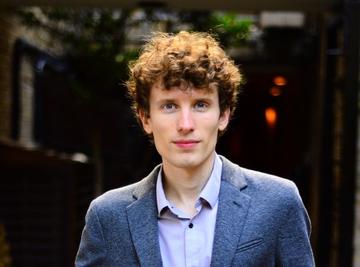
Dr Rob Laidlow, Career Development Fellow in Music at Jesus College.
Rob’s first grant has been made for the project ‘PLAY: Connecting Video Game Controllers, Musical Composition and Live Performance’. PLAY involves working with a research software engineer at the Royal Northern College of Music (RNCM) to create open-source software that turns common video game controllers into digital musical instruments, and offers a new perspective on how people interact with these objects.
The project also explores what composing for such a digital music instrument means in contemporary life by commissioning music written with the instrument by internationally active composers, and will offer gamers who are not familiar with a conventional instrument the opportunity to create high-quality, virtuosic, music.
Experimental group House of Bedlam will then give concerts in Oxford and Manchester using the instruments, with new music written by Bofan Ma, Hongshuo Fan, Ellen Sargen, and Rob himself. Concert audiences will also be invited to get hands-on with the equipment.
The project is funded by the Cultural Programme, with support from Jesus College and PRiSM – the centre for Practice & Research in Science & Music at the RNCM.
The second research project to have been awarded funding is ‘Everyday Objects and Musical Improvisation’, run in collaboration with the UdK, and funded by the Oxford-UdK Berlin Partnership in Arts and Humanities. ‘Everyday Objects and Musical Improvisation’ explores whether certain gestures linked to repetitive, and therefore embodied, interactions with everyday objects can be harnessed for musical expression. It also looks at whether common objects can be transformed into accessible musical instruments. Following a survey of objects and their associated gestures and activities, a prototype phase will produce interactive sound objects through collaboration with an interaction designer. The project will culminate in a workshop with professional musicians, and an analysis of the performances will offer insights into how these gestures can become instruments for musical expression.
In ‘Zimbabwean Mbira and storytelling in the digital age’ (Wednesday 22nd February), actor, composer and Mbira musician John Falsetto will perform an immersive musical experience that looks at how ancient oral storytelling traditions interact at the convergence of AI, education, and public engagement.
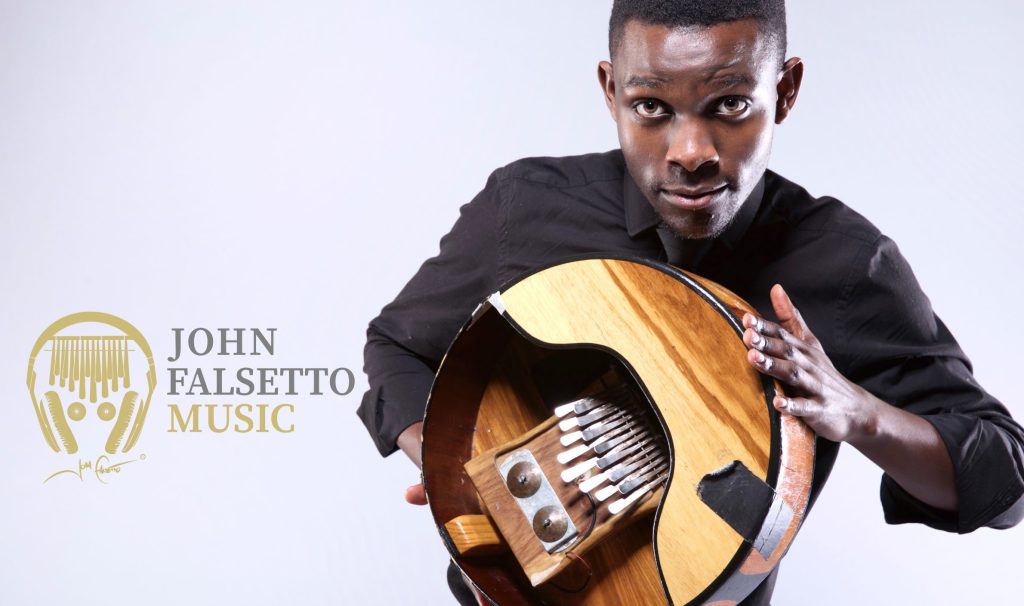
John Falsetto
John is currently a Visiting Fellow of the University of Oxford’s Humanities Cultural Programme for 2022/23, and his practice is concerned with the devising of performances and training that integrates traditional Zimbabwean and Shona Mbira culture for the digital age and audience. He assimilates audience and performance; capturing the spaces and sounds of the event to create a sense of engagement and community with those involved, leading up to a final musical piece where everyone becomes a participant in the outcome. This innovative approach has been a key feature in his workshops with performers and young people, as well as his practical lectures at the London Academy of Music and Dramatic Arts (LAMDA) and Guildhall School of Music and Drama.
On Friday 10th March, the Digital Hub will welcome pianist, composer and technologist Zubin Kanga for a recital titled ‘Cyborg Soloist’. Zubin has been at the forefront of curating and creating interdisciplinary musical programmes for over a decade. His unique and immersive work, which has been performed all over the world, seeks to explore and redefine what it means to be a performer, through interactions with new technologies. These technologies include motion sensors, artificial intelligence, live-generated 3D visuals, virtual reality, keyboards as video-game-style controllers, biosensors, and internet-based scores.
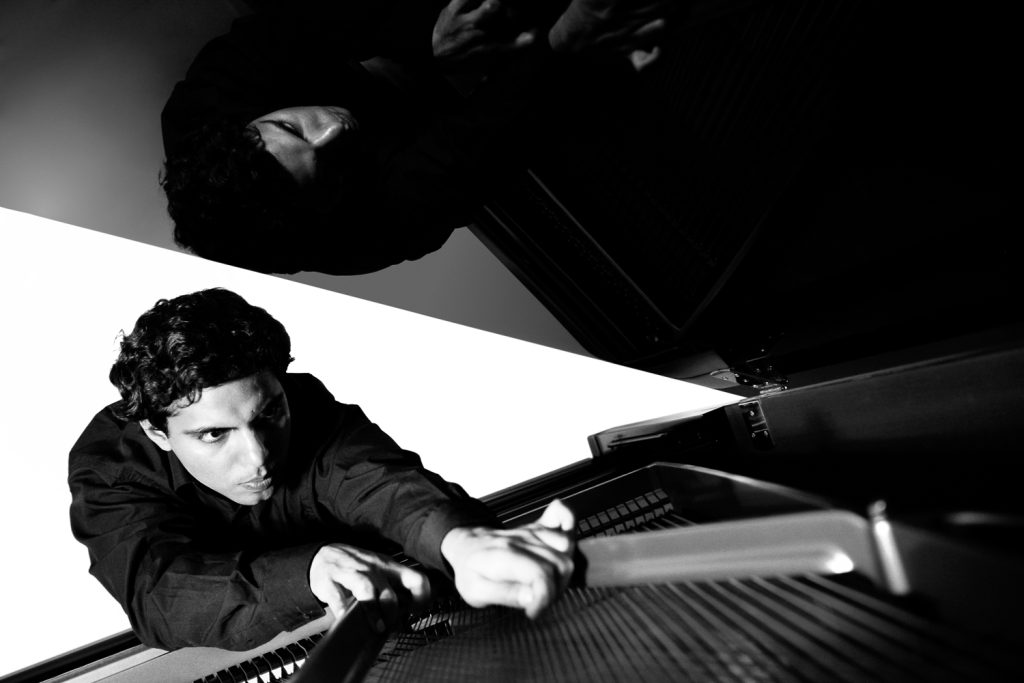
Zubin Kanga
Zubin will be making full use of the audio-visual capabilities of the Cheng Kar Shun Digital Hub to showcase brand new, technology-focussed music that has not yet been heard in Oxford. He’ll be performing on a range of instruments, including digital instruments, synthesizers, and a traditional piano.
Everyone is welcome to attend these immersive musical performances. To find out more about them, and other upcoming events in the Digital Hub, click here.